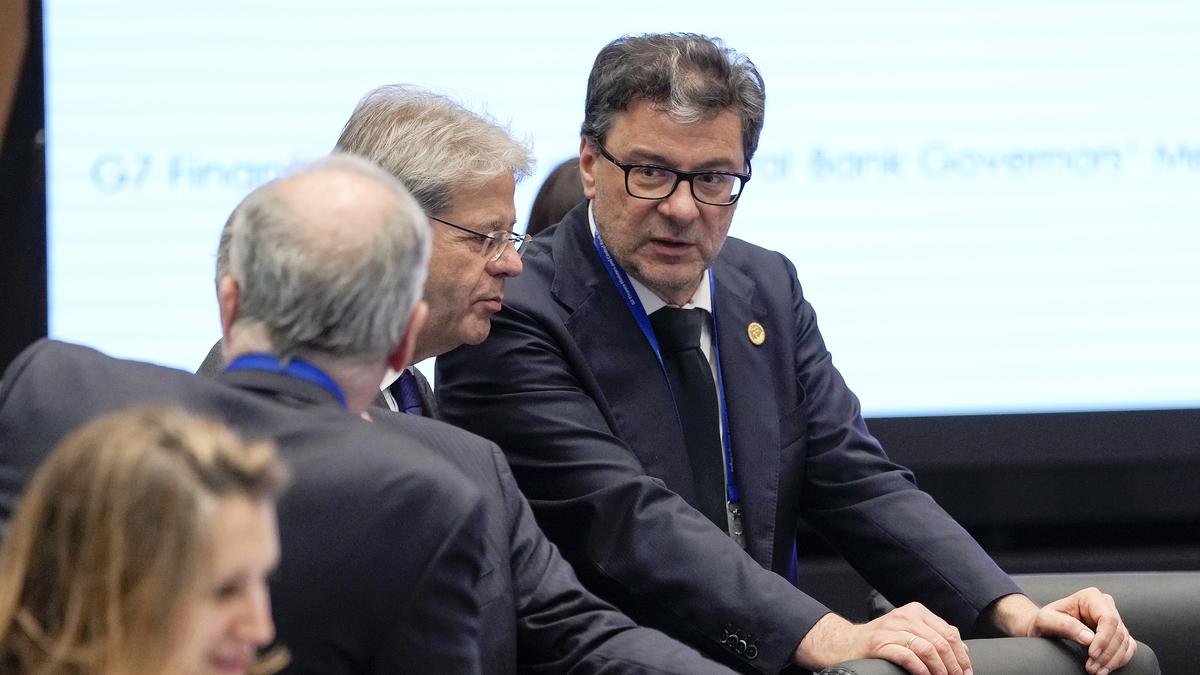G7 Finance Ministers to meet in Japan to tackle global economic challenges

Italy’s Finance Minister Giancarlo Giorgetti, right, talks with Governor of the Bank of Italy Ignazio Visco, second right, before the start of the G-7 Finance Ministers and Central Bank Governors’ Meeting at the Toki Messe convention center in Niigata, Japan on May 11, 2023.
| Photo Credit: AP
The financial leaders of the Group of Seven wealthy nations meet in Japan beginning on May 11 as a standoff over the U.S. debt ceiling. Potential default looms as one of the biggest threats to the global economy.
Treasury Secretary Janet Yellen said one of her priorities in Niigata, a port city on the Japan Sea coast, would be to emphasize the importance of resolving the standoff over the national debt in the world’s largest economy.
“A default is frankly unthinkable,” she told reporters before the broader meetings began. “America should never default. It would rank as a catastrophe,” she said.
She said the impasse over spending risks leaving the government unable to pay for teachers in classrooms, medical care for veterans, and vital benefits to many Americans. It also is undermining U.S. economic leadership.
While in Japan, Ms. Yellen is also bound to seek to reassure her counterparts over recent bank failures that have raised worries over risks for the global financial system.
The Finance Ministers and central bank governors are meeting for three days ahead of a G-7 summit later this month in Hiroshima.
President Joe Biden said on May 10 that he and congressional leaders had a “productive” meeting on May 9 on trying to raise the nation’s debt limit. They will meet again on Friday to try to avert the risk as soon as June 1 of an unprecedented government default if lawmakers in the divided Congress don’t agree to raise the debt ceiling.
Mr. Biden said he was “absolutely certain” that the country could avert a default, declaring that failure to meet America’s obligations, upon which much of the world’s finances are based, “is not an option.” Mr. Biden said it was “possible but not likely” that he would need to postpone his trip to Japan, Australia, and Papua New Guinea later this month.
Ms. Yellen said in remarks prepared before May 11’s meetings that strengthening the global financial system is a crucial G-7 priority. So is a renewed show of support for Ukraine as a coalition of over 30 countries seeks to impose heavy economic costs on Russia for its war.
She said Mr. Biden’s “historic” investments in modernizing U.S. infrastructure were a step toward improving the resilience of an economy whose reliance on global supply chains was sorely tested during the COVID-19 pandemic.
“We are taking a broad range of individual and joint actions to bring down inflation, sustain growth, and help mitigate the impact of external shocks, including to developing countries,” she said.
But she added, “Even as we face downside risks, I believe that the global economy remains in a better place than many predicted six months ago.” The Federal Reserve said in a report this week that U.S. banks raised their lending standards for business and consumer loans in the aftermath of three significant bank failures that were in part brought on by the central bank’s sharp increases in interest rates to beat down inflation that surges to four-decade highs after the pandemic.
The Fed surveyed 65 U.S. banks and U.S. branches of 19 foreign banks in late March and early April, well after Silicon Valley Bank and Signature Bank collapsed in early March, touching off the latest round of bank turmoil. First Republic Bank failed earlier this month in the second-largest bank failure in U.S. history.
Rate increases are meant to slow lending and borrowing but can overshoot their goal, tipping the economy into recession. Moves by banks to further limit lending could further squeeze businesses and consumers.
Inflation has remained stubbornly high. Consumer prices in the United States rose 0.4% in April, up sharply from a 0.1% rise from February to March, and measures of underlying inflation stayed high, a sign that further declines in inflation are likely to be slow and bumpy even though the annual increase of 4.9% was the smallest in two years.
Other G-7 economies are contending with even higher surging prices, obliging their central banks to raise interest rates that went to record lows in the early days of the pandemic.
G-7 financial leaders met just a month ago in Washington during the annual meeting of the World Bank and International Monetary Fund, where they reiterated their commitment to helping economies cope with the impact of the war in Ukraine, to help heavily indebted countries resolve their financial vulnerability, fortify global health systems and help to tackle climate change.
G-7 nations include Canada, France, Germany, Italy, Japan, the United Kingdom, and the United States. Other invitees to the meetings in Niigata include the European Union, IMF, and World Bank, and the finance ministers of Brazil, Comoros, India, Indonesia, South Korea, and Singapore.
For all the latest business News Click Here

